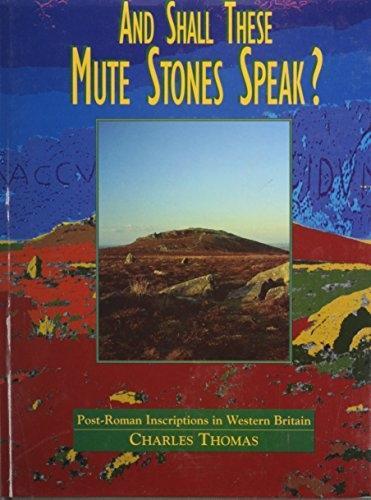
And Shall These Mute Stones Speak: Post-Roman Inscriptions in Western Britain
(Hardback)
Publishing Details
And Shall These Mute Stones Speak: Post-Roman Inscriptions in Western Britain
By (Author) Charles Thomas
University of Wales Press
University of Wales Press
2nd September 1994
United Kingdom
Classifications
Tertiary Education
Non Fiction
European history
Ancient history
936.2
Physical Properties
Hardback
377
Width 189mm, Height 246mm
Description
Stone inscriptions are the most important written source for 5th-7th century western-British history. Against a background for Old World prehistory and the classical civilizations, this book focuses on the inscribed memorial stones of Demetia (south-west Wales, modern-day Dyfed) and Dumnonia (Devon, Cornwall and part of Somerset). The author looks at cultural change after AD 400 by analyzing the evidence or "messages" left on memorial stones. The invention of the ogam script in Ireland and its use, with implications for both paganism and Christianity, on such stones is examined. A group of chapters is devoted to a praticular reconstruction of events in south-west Wales between AD 400 and 600 - the establishment of an Irish-decended kingdom of Dementia. The author demonstrates that the Dementians adopted first Latinity (use of Roman names, ets) and only then Christinity, influenced by sub-Roman native kingdoms to the east. The author then traces a remarkable "venture to the interior" - the foundation of a small Dementian kingdom in the upper Usk valley, and examines documentary evidence for the first settler-king - Brychan - and, as monk and saint, his connection with Lundy Island (in the Bristol Channel) and north Devon. Evidence for a post-Roman native kingdom in Cornwall, Devon and part of Somerset is next considered, as is minor Irish settlement in west Cornwall around the year 400, and an isolated introduction of Christianity from 5th-century Gaul. Inscribed stones show that the conversion of Dumnonia to Christianity - though field-work has revealed that, far from being a Land of Saints, the deep south-west did not become Christian until well into the 6th century.
Reviews
" . . . a very readable work and one in which scholars in the field will find much of interest . . . his book puts down some important pointers and provides a multitude of charts to guide us all in the future. For this he has earned our admiration and our thanks." -Cambrian Medieval Celtic Studies
-- "Cambrian Medieval Celtic Studies""This is a stimulating, original and highly persona; book, the success of which in reaching its target, 'the ordinary reader', is demonstrated by the sales figures to date." -Antiquaries Journal
-- "Antiquaries Journal"". . .a fascinating detective story, whose arguments are at once imaginative a coherent, which in their essentials carry conviction. It is hard to think of a more perfect companion for a holiday in western Britain, whose enigmatic landscape is vividly brought to life in this major contribution to early medieval studies." -Times Higher Education Supplement-- "Times Higher Education Supplement"
" . . .this is an immensely impressive book. Thomas gives us severe scholarship sweetly presented: the book is one of mature learning, but it is also an excellent read. Only Thomas could have written it; and we must all be grateful that he has done so." -Cornish Archaeology
-- "Cornish Archaeology"". . .a splendid treasure chest of ideas. . ." -Current Archaeology
-- "Current Archaeology""It is not an easy book to review, chock-full, as it is, of material to, in turns, excite, perplex, inform, entertain, frustrate, and intrigue." -Peritia
-- "Peritia"Author Bio
Charles Thomas was born in 1928 in Cornwall, where he developed an early interest in archaeology, languages and history. Until his retirement in 1991 he was Professor and Director of the Institute of Cornish Studies, University of Exeter. He is the founder of the journals Cornish Archaeology and Cornish Studies. Professor Thomas is a Fellow of the British Academy, and a former President of the Council for British Archaeology, and the Royal Institution of Cornwall. His many publications include: The Early Christian Archaeology of North Britain (1971), Britain and Ireland in Early Christian Times (1971), Christianity in Roman Britain (1981), Exploration of a Drowned Landscape: Archaeology and History in the Isles of Scilly (1985), Celtic Britain (1986) and Tintagel: Arthur and Archaeology (1993).ISBN 0-7083-1160-1
